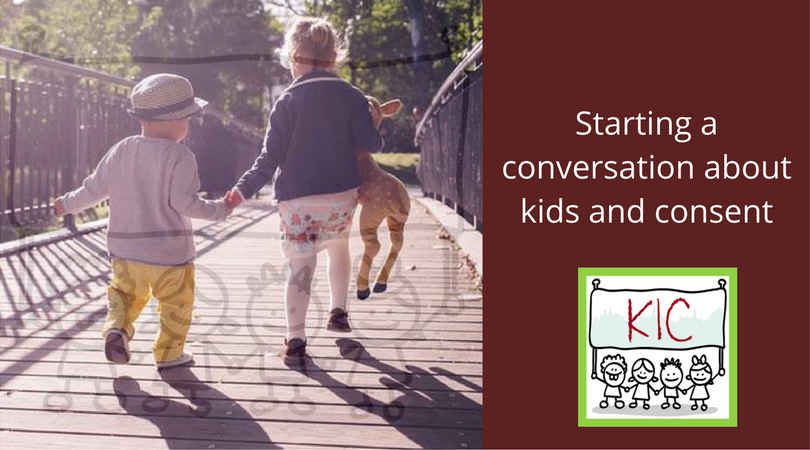Starting a conversation about kids and consent
/A couple of weeks ago my daughter and some friends went for a walk in our neighbourhood. A fight broke out between my daughter and one of the other little girls. This girl wanted my daughter to hold her hand and my daughter didn’t want to. The friend then proceeded to cry the whole way home and call my daughter mean.
Old me would have told her that she should have just held hands with the girl. It wouldn't have hurt anyone, especially if it makes the other person happy. But the me who has been trying to learn about consent in the last few years instead said “Well, it sounds like it was very disappointing for your friend but she needs to understand that you are allowed to say no if you don’t want to touch someone.”
The next morning I saw a link to a new workshop my friend Nadine Thornhill is putting on, which is all about kids and consent. I thought this would be the perfect opportunity to open up a conversation about consent both with her and the Kids in the Capital community. I asked her if she'd be willing to be interviewed by me and was so thrilled when she said yes. Check out her answers below.
But first, who is Nadine and why does she know about consent?
Dr. Nadine Thornhill, Ed.D has been teaching youth and adults about sexuality and relationships for over a decade. As a parent, she knows how challenging it can be to figure out what to say and how to talk with your kids about sex and relationships. As an educator, Nadine’s goal is to empower parents to share authentic values and provide fact-based, age-appropriate information about sexuality and help kids grow up safe, happy, and healthy!
Let's jump in to the interview questions!
What is consent?
The super-simple answer is that consent is permission. Often when we hear the word "consent" in mainstream North American culture, we think specifically of sexual consent, which is permission to do sexual things with other people. But broadly speaking, consent is life-skill. It's something we practice and expect in several areas of our lives.
One of the most prevalent situations, and one I use when I'm teaching parents, is how we practice consent in other people's homes. When we visit someone else's home, we get an explicit invitation. We ask permission again by knocking or ringing when we arrive. We accept whatever boundaries we're given about what rooms we're allowed to enter, what we can use, what we can touch. Even in situations when we're hanging out with someone we know really well, someone who let's us treat their home as our own, we always accept that it's their home. If they want us to leave, we know we have to leave. If they don't want us over, we don't go over.
I always encourage people to teach their kids to treat other people's bodies they way they would treat other people's houses.
When should we start having conversations with our kids about consent?
Conversations about consent can start when children are very young, as early as 2 or 3. For little people we're not talking about sexual consent. But we can teach them to respect people's bodies. Even things like telling a toddler, "We don't hit. We don't hurt people when we feel bad," let's them know that they shouldn't impose their feelings/impulses/desires on other people's bodies.
We can teach younger kids that they have a right to decide if they want to show affection in physical ways. What happened with your daughter (editor's note, this is the story I introduced the post with) and her friend is a perfect example. You turned that into a teachable moment - not about sexual consent - but about friendly consent.
There are so many ways that we can help our kids learn values that are related to consent when they're young. That way when they're older and ready for more mature types of relationships - like sex and romance - they already know how to do what's required when practicing consent.
How can we teach consent?
So I've probably covered some of this in earlier questions. I think talking to our kids about consent is important, and even more important is modelling what consent looks like. Not only for our kids, but because, like I said consent is a life skill. As adults, we should be practicing it, not just as lesson for children, but because it's what's right. :-)
Tickling games
Lara: One of the ways that consent has come up in our house (and that differs from when I was a kid) is with tickle games. I don’t know about you but when I was a kid I would get tickled until I had to beg for people to stop and scream uncle. Tickling games were the norm when I was a kid and I don’t think any adult would think they were doing anything inappropriate if they kept tickling a child even after they were asked to stop.
In our house if my kids ask me to stop when we’re fooling around with tickling or any play roughhousing, I always stop immediately and remind them that they have to do the same if asked. Is this a good example of how to teach consent? Are there any other easy ways that people can teach consent in day to day ways?
Nadine: Yes. I love this example because it's about affection, play and having fun. When kids (or folks of any age), know that their "stops" and "nos" will be heard and honoured, it actually gives them more freedom to really let loose and enjoy positive physical interaction.
Are there any other easy ways that people can teach consent in day to day ways?
Some kids get really hyper during tickling or chasing games. Because they're so overwrought and excited, they literally don't hear a parent or another kid's "no"s. Or they're chasing each other, and they can't tell the difference between "I'm running away or screaming as a fun part of them game" vs. "I'm running away or screaming because I'm legitimately scared and upset." In cases like these, you can set up a code word. I recommend using word that wouldn't naturally come up in the game. If someone says it, the game stops. A word like "RAINBOW!" or "PUMPKIN PIE" (I'm obviously in fall mode) that if we hear it, we all stop. Then we check in with a question like, "are you okay?", "do you want to stop?", etc.
Is "no means a no" a good lesson to teach?
I think it's good...but woefully incomplete. I mean absolutely, if you ask someone if they want to do something sexual and they say "no", then listen, believe and respect that answer. Sex is not happening, so let it go. But "no means no" implies that there's no nuance in sexual activity or negotiation, which simply isn't true.
"No means no," ignores social realities like the fact that a lot people in our culture aren't socialized to be assertive. As a young, black, girl I was taught to be polite, kind and compliant. Assertiveness was actively discouraged, lest I grow up and fall into the "angry, black woman" stereotype. Giving a straightforward "no", especially during something as vulnerable as sex was incredibly hard for me for a long time, as I know it's hard for many people.
The lack of a firm "no", doesn't always mean, "sure, go ahead, this sex is great!" It could mean, "I'm not into this but I've also been trained my whole life not to hurt people's feelings, so I don't have the tools to just say no to you, maybe I'll just lie here unenthusiastically or give a roundabout answer and hope you pick up on my discomfort."
"No means no," doesn't work for people who are non-verbal or have difficultly speaking. There's an assumption in our culture that people with disabilities aren't sexual, but they are, and they have the same right to consensual fun as the rest of us.
I also think for young people, or anyone who's new to sex, the "no means no" model can be tough, because without any prior sexual experience, you may not *know* what you do or don't want sexually. "Yes" doesn't ever mean "yes to every possible human sexual activity ever." Again, most of us have certain sex acts that are hard "nos" without ever having to try them. But sometimes we don't know - especially without experience. So for young people, the answer to "do you want to have sex?" might not be "No" or "yes", but rather, "I'm definitely a 'no' to ABC, but I'm kind of curious about XYZ and I might like to try, but I also want to be able to stop if I'm not into it."
What is the one thing you hope parents understand about consent (and helping their kids understand it)
Honestly, there's so much! I could write ten books about families and teaching consent (I will write at least one, one day). But if I had to pick just one thing, it would be that at it's core true consent comes from caring about others. And that's in any relationship be it family, friendship, acquaintances, romantic, sexual, long-term, casual, one-night stand, whatever. Consent happens when we care about ourselves and about the needs, desires and well-being of others.
You’re running an online workshop starting in November - tell us about it, and why it would be of interest to parents of pre-teens.
I've wanted to run this workshop for such a long time. I'm so excited to be launching it online, because now it's accessible to folks no matter where they are in the world. It also lets each participants do the workshop whenever they want and a pace that best suits them.
This is an ideal workshop for parents of preteens. I cover a ton of information about how to teach foundational lessons about consent to little kids and school agers. I've tried to give folks different options. There are conversation prompts and cues, if you want to have a sit-down conversation with your child. There are also lots of tips for families who want to model consent or slip lessons into every day activities like watching TV or even texting! I also have exercises and info sheets for my fellow consent nerds that can't get enough of this stuff.
*************************************************************************************************************
Thank you so much to Nadine for taking the time to answer my questions. I've signed up for the course because I'm really interested in learning how to work with my kids to make sure this is ingrained in them from a very young age. Will you join me?







